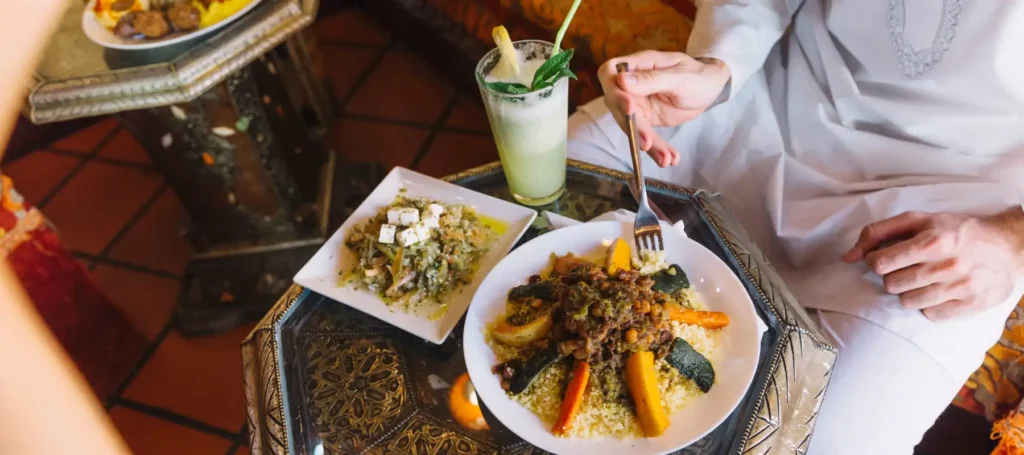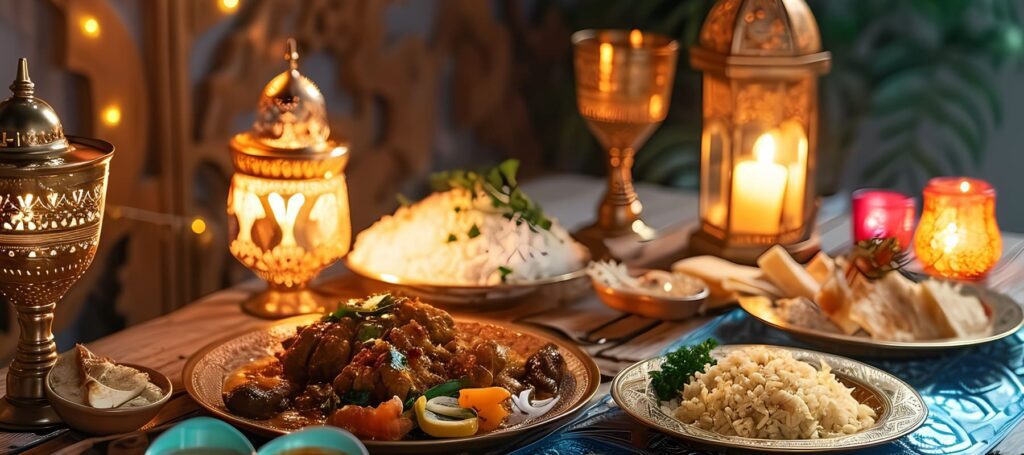Tips for healthy eating in Ramadan
As we reach the midway point of Ramadan, many people start feeling the effects of fasting – low energy, dehydration, and shifts in sleep patterns. While fasting brings spiritual and personal growth, it’s essential to also take care of your body by making the right food choices for suhoor and iftar. Here are the best tips to make the best nutrition choices in Ramadan:
- Focusing on balanced nutrition.
- Have a good hydration plan.
- Practice smart meal planning.
These tips will ensure that your body gets the nutrients it needs to keep up with daily activities while fasting. Here’s how to stay energized, refreshed, and nourished for the rest of Ramadan.
Common Challenges Faced Midway Through Ramadan
By the second or third week of Ramadan, your body has adjusted to the fasting routine, but certain nutritional challenges can start to arise. Here’s what many people experience:
Fatigue and Low Energy Levels
- A drop in energy is common, especially if you aren’t getting enough protein, fiber, and complex carbs in suhoor.
- Long hours of fasting without the right nutrients can lead to brain fog and sluggishness.
Dehydration and Headaches
- Not drinking enough water and taking electrolytes during non-fasting hours can lead to dehydration, headaches, and dizziness.
- Consuming caffeinated drinks (coffee, tea, soda) at suhoor can make dehydration worse.
Disruptions to Sleep and Digestion
- Eating heavy meals at iftar and going to sleep soon after can cause bloating and discomfort.
- Lack of fiber can lead to slowed digestion and constipation.
Pro Tip: To stay on track in healthy eating in Ramadan, make healthy choices , reduce sugar consumption, and focus on healthy nutrition.
Energy-Boosting Foods to Include in Suhoor
A well-balanced Ramadan meal plan starts with a nutritious Suhoor to sustain energy levels throughout the day. Including energy-boosting foods like slow-digesting carbs that can provide carbs, protein, and essential vitamins to keep you energized during fasting hours. Yogurt and dates offer quick hydration and natural sugars for an instant energy lift. Don’t forget fiber-rich foods like lentils and vegetables to aid digestion and prevent sluggishness. By incorporating these Suhoor superfoods into your Ramadan meal plan, you can stay active, focused, and hydrated from dawn to dusk.
Best Slow-Digesting Carbs for Sustained Energy
- Oats & Whole Grains: Slowly release energy to keep you full longer.
- Sweet Potatoes & Quinoa: Great sources of fiber and complex carbs.
- Bananas & Dates: Provide natural sugars for quick energy without a crash.
Healthy fats for long-lasting satiety
- Avocados: Packed with healthy fats to keep you full and energized throughout the day.
- Nuts: Rich in protein and good fats for sustained energy and mental clarity.
- Chia seeds: High in fiber and omega-3s to boost hydration and slow digestion.
Hydrating Foods to Keep You Refreshed All Day
- Cucumbers & Watermelon: High in water content, helping with hydration.
- Yogurt: Retains moisture in the body and aids digestion.
- Coconut Water: A natural electrolyte booster to prevent dehydration.
Pro Tip: Avoid salty and fried foods at suhoor, as they can make you thirstier throughout the day.
The Best Iftar Choices for a Balanced Diet
Breaking your fast with the right Iftar choices is key to maintaining energy, hydration, and overall health during Ramadan. Start with dates and water to replenish glucose and fluids naturally, then follow up with a balanced meal featuring lean proteins, complex carbs, and fiber-rich vegetables to aid digestion. Avoid fried or overly processed foods to prevent sluggishness. By choosing nutrient-dense, wholesome ingredients for your Ramadan meal plan, you can enjoy a satisfying Iftar while supporting your body’s needs after a long day of fasting.
Foods That Replenish Lost Nutrients
- Soups & Broths: A light, hydrating way to prepare the stomach for a meal.
- Grilled Chicken & Fish: Lean proteins that aid muscle recovery.
- Brown Rice or Whole Wheat Bread: Fiber-rich complex carbs that provide steady energy and support digestion.
- Hummus & Avocados: Provide healthy fats for sustained energy.
- Fresh Vegetables & Salads: Packed with vitamins, minerals, and hydration to replenish nutrients after fasting.
- Yogurt or Laban: Probiotic-rich dairy options that aid digestion and restore gut health.
- Fruits (Watermelon, Berries, Oranges): Hydrating and rich in antioxidants for a natural energy boost.
- Healthy Fats (Olive Oil, Nuts): Support heart health and keep you satiated longer.
- Legumes (Beans, Chickpeas): Plant-based proteins and fiber to promote fullness and stable blood sugar.
Pro Tip: Eat slowly and mindfully. Start with dates and soup, then gradually introduce protein and vegetables to prevent bloating.
Smart Meal Planning for Healthy Eating in Ramadan
Balancing work, prayer, and social gatherings can make cooking feel overwhelming. A structured Ramadan meal plan can save time while ensuring you get the right nutrition every day.
Having a healthy Ramadan meal plan is essential for maintaining your well-being and energy levels during this holy month. By focusing on nutritious foods and balanced meals, you can ensure that your body receives the necessary nutrients to sustain you throughout the day while fasting.
How MealPlanet Helps a Healthy Eating in Ramadan goal
Curated Iftar & Suhoor Meal Plans
Enjoy a variety of healthy and traditional dishes without the hassle of cooking daily.
Dietary Flexibility
Whether you’re looking for high-protein meals, vegetarian options, or low-carb and keto meal plans, there’s something for everyone.
Delivered Across the UAE
Have fresh, nutritious meals sent straight to your doorstep so you can focus on fasting and worship.





